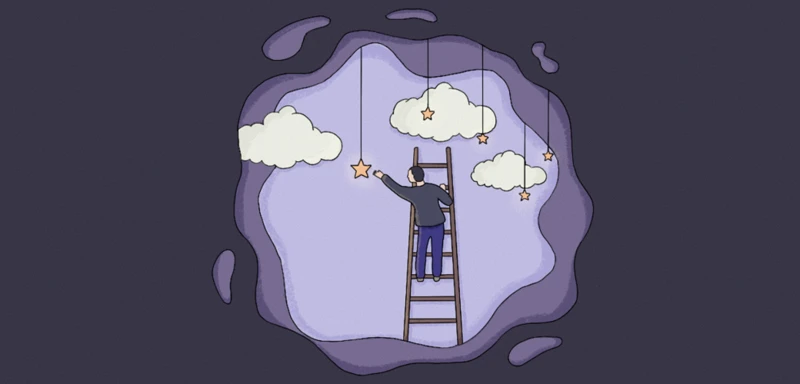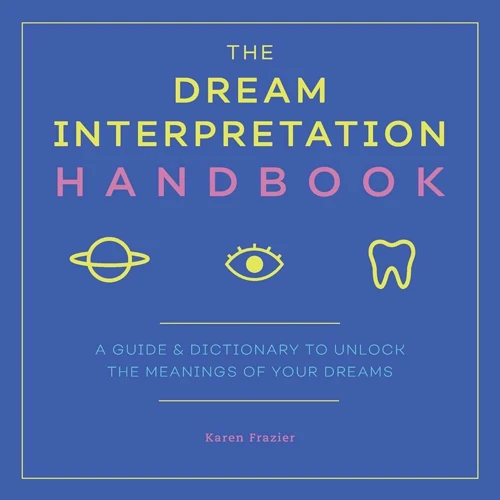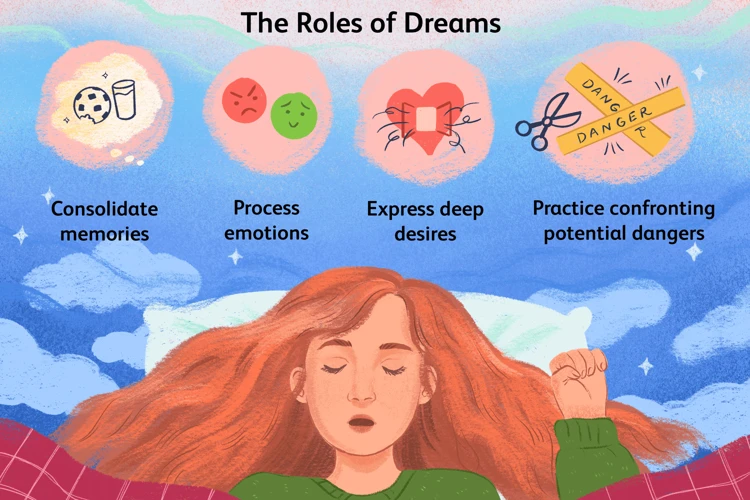Have you ever woken up from a vivid dream and wondered what it meant? Dreams have long fascinated and intrigued people, as they can offer a window into our subconscious minds. Whether you experience lucid dreams, nightmares, or recurring dreams, each holds valuable insights and messages that can guide us in our waking lives. In this article, we will explore the significance of dreams and delve into the various types of dreams and their meanings. Join us on a journey of dream interpretation to unlock the hidden wisdom of your nighttime adventures.
The Significance of Dreams

Dreams hold a significant role in our lives, serving as a portal to our subconscious minds and offering valuable guidance and insights. Understanding the psychological significance of dreams can help us unravel the mysteries they hold. Dreams provide a way for our underlying thoughts, feelings, and desires to manifest symbolically, allowing us to gain a deeper understanding of ourselves and the challenges we face. Dream interpretation can provide us with a glimpse into our intuition and inner wisdom, helping us make better decisions and navigate through life’s complexities. Exploring the benefits of dream interpretation can provide us with a toolkit to unlock the hidden meanings of our dreams and harness their power for personal growth and self-discovery.
The Role of Dreams in Psychology
Dreams play a significant role in the field of psychology, offering a wealth of insights into our subconscious minds. As our mind processes and consolidates information from our waking lives, it often manifests in our dreams. Psychologists believe that dreams serve as a way for our minds to process emotions, memories, and unresolved experiences. They can reveal hidden desires, fears, and conflicts that we may not be aware of in our conscious state.
One of the primary roles of dreams in psychology is to act as a gateway to our unconscious mind. Within our dreams, symbols, and imagery emerge, representing deeper layers of our psyche. The interpretation of these symbols can provide valuable understanding into our thoughts, feelings, and behaviors.
Dreams also serve as a platform for exploring our intuition. Our subconscious mind may hold valuable insights that we are not consciously aware of. By examining and interpreting our dreams, we can tap into this intuitive wisdom and gain a deeper understanding of ourselves and our lives. The role of intuition in dream interpretation allows us to access hidden truths and guidance that can greatly benefit our personal growth and decision-making processes.
Additionally, dreams can offer a therapeutic function in psychology. They can help us process and release emotions and trauma from our lives. Through dream analysis, psychologists can guide individuals in exploring the underlying meanings and emotions behind their dreams, helping to uncover unresolved issues and facilitate healing.
Understanding the role of dreams in psychology opens up a world of self-discovery and personal growth. By delving into the symbols and messages within our dreams, we can gain valuable insights that can assist us in our journey towards self-awareness and fulfillment. So, let’s explore the fascinating realm of dream interpretation and discover the hidden meanings that lie within our nightly adventures.
Benefits of Dream Interpretation
Dream interpretation offers a multitude of benefits, making it a valuable tool for self-discovery and personal growth. By diving into the symbolism and meanings behind our dreams, we gain deeper insights into our subconscious mind and unravel hidden patterns and emotions. One of the key benefits of dream interpretation is that it helps us gain a better understanding of ourselves. Dreams often reflect our fears, desires, and unresolved conflicts, allowing us to explore and process these aspects of our psyche. This self-reflection can lead to greater self-awareness and personal development. Additionally, dream interpretation can provide us with guidance and clarity when making important decisions or navigating challenging situations. Dreams can offer alternative perspectives, presenting solutions or highlighting matters that we may have overlooked in our waking life. By paying attention to our dreams and interpreting their messages, we can tap into our intuition and access our inner wisdom. Dreams can also serve as a source of inspiration and creativity. Many artists, innovators, and writers have found inspiration from their dreams, using them as a catalyst for new ideas and perspectives. Dream interpretation allows us to tap into this creative potential and unlock new avenues for exploration. Whether we engage in self-reflection, seek guidance, or harness creativity, the benefits of dream interpretation are vast and can significantly enhance our understanding of ourselves and the world around us. So, embrace the power of dreams and embark on a journey of self-discovery and personal growth through the fascinating realm of dream interpretation.
Types of Dreams

Dreams come in various forms, each offering unique insights and experiences. Understanding the different types of dreams can help us navigate their meanings and messages. One type of dream is lucid dreams, where the dreamer becomes aware that they are dreaming and can actively participate in and control the dream. Nightmares are another type of dream characterized by intense fear, anxiety, and distress. These dreams can sometimes reflect unresolved issues or hidden fears in our waking lives. Recurring dreams, which repeat themselves over time, may indicate unresolved emotions or situations that require attention. Prophetic dreams, on the other hand, may offer glimpses into the future or provide intuitive guidance. Exploring the different types of dreams allows us to delve into their rich symbolism and uncover their hidden meanings.
1. Lucid Dreams
Lucid dreams are a fascinating phenomenon that occur when we become aware that we are dreaming while still in the dream state. These dreams offer a heightened sense of consciousness, allowing us to have some level of control and influence over the dream narrative. During a lucid dream, we can actively participate in shaping the dream environment, manipulating the storyline, and even engaging in activities that may seem impossible in waking life. One of the key features of lucid dreaming is the ability to recognize and question the dream state, distinguishing it from reality. This self-awareness opens up a world of possibilities for exploration, creativity, and self-discovery.
Lucid dreaming can be a powerful tool for personal growth and development. By harnessing the control and awareness within lucid dreams, individuals can confront and overcome fears, practice new skills, and even seek guidance from their subconscious minds. Lucidity in dreams allows for introspection and the opportunity to delve deeper into the meanings behind the dream symbols and experiences. Those who regularly experience lucid dreams often report greater self-awareness, improved problem-solving abilities, and enhanced creativity in their waking lives.
To achieve lucidity in dreams, various techniques can be practiced, such as reality testing, dream journaling, and meditation. Reality testing involves regularly questioning the waking state by checking for inconsistencies or unusual occurrences throughout the day. This habit can carry over into dreams, triggering moments of realization that one is indeed dreaming. Keeping a dream journal allows for the documentation of dreams upon waking, encouraging the development of dream recall and aiding in the identification of recurring themes or patterns. Meditation, specifically focused on lucid dreaming, can help individuals become more present and aware, increasing the likelihood of becoming lucid within dreams.
Exploring the world of lucid dreaming can be an exciting and transformative journey. Whether for personal growth, spiritual exploration, or simply the thrill of navigating alternate realities, lucid dreaming offers a unique and immersive experience. If you’re interested in further exploring the world of dreams and their interpretation, check out our article on methods of dream divination or delve into the fascinating connection between astrology and dream interpretation.
2. Nightmares
Nightmares can be unsettling and leave us feeling shaken upon waking. These distressing dreams are characterized by intense fear, anxiety, or a sense of impending doom. They often involve vivid and alarming scenarios that can be challenging to forget. However, it is important to recognize that nightmares serve a purpose in our subconscious mind. They act as a release valve for our anxieties and fears, allowing us to confront and process them in a symbolic and metaphorical way. Nightmares can surface when we are undergoing stress or facing unresolved traumas, acting as a warning sign that something in our waking life requires attention or resolution. It is crucial not to dismiss nightmares but rather to explore their underlying messages. Keeping a dream journal can help identify patterns and recurring themes within nightmares, enabling us to gain a deeper understanding of their significance. Seeking support from a professional therapist or dream interpreter specialized in dream analysis can be valuable in deciphering the meaning behind these dark and unsettling dreams. By facing and processing our nightmares, we can transform our fears into opportunities for growth and healing.
3. Recurring Dreams
Recurring dreams are a fascinating aspect of dream psychology. These are dreams that occur repeatedly, often with similar themes, settings, or characters. They can be both puzzling and revealing when it comes to dream interpretation. Recurring dreams often symbolize unresolved issues or emotions that we have not yet addressed in our waking lives. They serve as reminders or nudges from our subconscious, urging us to pay attention and take action. These dreams can manifest as recurring nightmares, highlighting deep-seated fears or anxieties that need to be acknowledged and resolved. On the other hand, recurring dreams can also convey positive messages or lessons that we need to integrate into our lives. Analyzing the patterns, symbols, and emotions within recurring dreams can provide valuable insights into our subconscious mind and guide us toward personal growth and healing. If you frequently experience recurring dreams, it may be helpful to keep a dream journal and consult with a dream interpreter or therapist who can help you unravel their meanings.
4. Prophetic Dreams
Prophetic dreams hold a special place in the realm of dream interpretation. These dreams are believed to provide glimpses into the future or offer insights and warnings about upcoming events. The concept of prophetic dreaming has been present in various cultures and traditions throughout history. In these dreams, individuals may receive vivid and detailed information about a specific event, person, or situation that will unfold in their waking life. It is important to note that not all dreams can be classified as prophetic, and distinguishing them from ordinary dreams requires careful observation and reflection. Some common signs of prophetic dreams include a heightened sense of clarity, intense emotions, or a strong feeling of déjà vu upon experiencing the events in waking life. While it is not always easy to interpret prophetic dreams, keeping a dream journal and documenting the details can help in recognizing patterns or connections between dreams and real-life occurrences. Exploring the symbolic meaning and messages within prophetic dreams can empower individuals to be more attuned to the signs and guidance that their dreams provide. By paying attention to these prophetic dreams, one can gain valuable insight and possibly alter the course of their future.
Key Symbols in Dreams

In dreams, symbols play a crucial role in conveying hidden messages and meanings. Understanding the key symbols that often appear in dreams can help unravel their significance. One common symbol is flying, which represents freedom, ambition, and the ability to rise above challenges. Water symbolizes emotions, spirituality, and the ebb and flow of life. Another symbol found in dreams is animals, which can represent our instincts, emotions, or even specific qualities associated with the animal itself. Additionally, falling signifies a loss of control, fear, or a need for stability. By recognizing and interpreting these symbols, we can gain deeper insight into the messages that our dreams are trying to communicate to us.
1. Flying
Flying dreams are often regarded as one of the most exhilarating and awe-inspiring experiences in the realm of dream interpretation. This dream symbolizes a sense of freedom, liberation, and the ability to rise above challenges or limitations. When you dream about flying, it signifies a release from the constraints of reality and a desire to explore new horizons. This dream can represent personal growth, ambition, and a willingness to take risks in order to achieve your goals. Additionally, flying dreams are often associated with a sense of empowerment and confidence in your own abilities. They can also symbolize a need for escapism or a desire to transcend the ordinary aspects of life. However, it’s important to consider the context and emotions associated with the flying dream, as they can provide additional insight into its meaning. For some individuals, flying dreams may be accompanied by feelings of exhilaration and joy, while for others, there may be a sense of fear or vulnerability. Flying dreams encourage us to embrace our aspirations and believe in our ability to soar to new heights in life.
2. Water
Water is a recurring symbol in dreams that carries diverse meanings and interpretations. The significance of water in dreams can vary depending on the context and individual experiences. Here are several possible interpretations of dreams involving water:
1. Cleansing and Renewal: Water often represents purity and renewal. Dreaming of clear, flowing water can indicate a desire for emotional cleansing or a fresh start in life. It may symbolize letting go of negative emotions or past experiences and embracing a clean slate.
2. Emotional State: The state of the water in the dream can reflect the dreamer’s emotions. Calm, tranquil waters may signify a sense of inner peace and harmony, while turbulent or murky waters might indicate emotional turmoil or unresolved feelings.
3. Fluidity and Adaptability: Water is a fluid element, and dreaming about water can represent adaptability and flexibility in various aspects of life. It may suggest the need to go with the flow and handle situations with greater ease.
4. Renewal of Health or Spirituality: In some cases, water dreams can be related to physical or spiritual healing. It may indicate a need for rejuvenation or a reminder to take care of one’s well-being.
5. Overwhelming Emotions: Dreams featuring large bodies of water, such as floods or tidal waves, may suggest being overwhelmed by emotions or a challenging situation. It may be a sign to address these emotions or seek support to prevent being engulfed by them.
Remember, interpreting dream symbols is highly personal, and the meaning of water in dreams can differ based on an individual’s unique experiences and associations. It is essential to consider the dream in its entirety and analyze how the water symbol resonates within the dreamer’s life.
3. Animals
Animals in dreams serve as powerful symbols that can provide valuable insights into our subconscious. Each animal carries its own unique symbolism and meaning, which can vary depending on cultural, personal, and contextual factors. Here are some common interpretations associated with animals in dreams:
- Birds: Birds often symbolize freedom, spirituality, and a desire for transcendence. They may represent our aspirations, goals, or the need to break free from limitations.
- Cats: Cats are often associated with intuition, independence, and mystery. Seeing a cat in a dream can indicate the need to trust your instincts or embrace your feminine energy.
- Dogs: Dogs symbolize loyalty, companionship, and protection. Dreaming of dogs can indicate the presence of trusted friends or a need for support and guidance in your life.
- Snakes: Snakes are complex creatures that often represent transformation, healing, and hidden knowledge. While their presence may initially evoke fear, snakes in dreams can signify personal growth and the shedding of old patterns.
These interpretations are not definitive and can vary based on personal experiences and cultural beliefs. To fully understand the symbolism of animals in your dreams, it is important to reflect on your own associations and emotions towards specific animals. Additionally, considering the actions and behaviors of the animals in your dream can provide further insight into their meaning. Remember, dream interpretation is a highly personal journey, and exploring the symbolism of animals within your dreams can help you gain a deeper understanding of yourself and your subconscious mind.
4. Falling
Falling dreams are some of the most common and vivid experiences that people have during sleep. These dreams often leave individuals with a sense of unease and anxiety upon waking. Symbolically, the act of falling in a dream represents a loss of control or a lack of stability in one’s waking life. It can be interpreted as a reflection of feeling overwhelmed, out of balance, or facing a major setback or failure. However, it’s important to note that the meaning of falling in a dream can differ from person to person and should be analyzed in the context of an individual’s unique experiences and emotions. For some, falling dreams may indicate a fear of failure or a sense of being unsupported in their endeavors. For others, it may signify a need for surrender or letting go of control. It is essential to consider the overall theme of the dream and the emotions evoked during the falling experience. By keeping a dream journal and reflecting on the feelings associated with the dream, one can gain valuable insights into the underlying messages and implications for their waking life. Remember that dream interpretation is highly subjective, and seeking guidance from a professional or exploring various methods of dream divination can provide further clarity on the meaning of a falling dream in a specific context.
Tips for Dream Interpretation

When it comes to interpreting dreams, there are several helpful tips to keep in mind. First and foremost, keeping a dream journal can be a valuable tool in capturing the details of your dreams and allowing you to reflect on them later. By jotting down key elements, emotions, and symbols, you can start to identify patterns and recurring themes. Another important tip is to reflect on your emotions during and after the dream. Emotions can provide clues about the underlying meanings and messages of the dream. Additionally, paying attention to the context of the dream is essential. Consider the people, places, and events in the dream and how they might relate to your waking life. Lastly, if you find yourself struggling to interpret your dreams, don’t hesitate to seek professional help from a therapist or dream expert who can provide guidance and insights.
1. Keep a Dream Journal
Keeping a dream journal is a powerful tool for unlocking the meaning behind your dreams. By recording your dreams in a journal, you create a consistent practice of reflecting on and documenting the details and themes of your dreams. When you wake up, try to recall as much as possible about your dream and write it down in your journal. Include specific details such as people, places, objects, and emotions that stood out to you. By consistently recording your dreams, you may start to notice patterns and recurring symbols that can help you gain a deeper understanding of your subconscious thoughts and desires. Additionally, writing down your dreams can help improve your dream recall over time. This practice allows you to explore different interpretations and connect the dots between your dreams and your waking life experiences. Having a dream journal can serve as a valuable reference point for future reflection and analysis, helping you uncover the guidance and insight that your dreams provide.
2. Reflect on Emotions
When it comes to dream interpretation, reflecting on the emotions experienced within a dream can provide valuable insights into its meaning. Emotions are a powerful indicator of our underlying thoughts and feelings, and they often manifest in our dreams. Take note of the emotions you experienced during the dream, whether it was fear, happiness, sadness, or confusion. These emotions can offer clues about the messages your subconscious is trying to convey. For example, if you felt intense fear in a dream, it could indicate that you are facing anxieties or unresolved fears in your waking life. On the other hand, if you felt joy and happiness, it may symbolize contentment or fulfillment. Pay attention to the intensity and duration of these emotions as well, as they can provide additional context. By reflecting on the emotions experienced in your dreams, you can gain deeper insights into your own psyche and uncover hidden thoughts and emotions that may be influencing your daily life.
3. Pay Attention to Context
When interpreting your dreams, it is crucial to pay attention to the context in which they unfold. Every detail and aspect of the dream can provide valuable clues and insights into its meaning. Firstly, consider the setting of the dream. Is it familiar or unfamiliar? Is it a real-life location or a fantasy world? The setting can shed light on the emotions and experiences associated with that particular place. Secondly, take note of the people present in the dream. Are they familiar or unknown? Our interactions with others in dreams can symbolize different aspects of our relationships and connections in waking life. Additionally, pay attention to the events and actions taking place in the dream. Are they mundane or extraordinary? Are there any recurring themes or symbols? These elements can provide deeper understanding and connotations to the symbolism within the dream. Finally, consider your own emotions and reactions during the dream. How did you feel in the dream? Emotions can carry significant meaning and provide insight into your unconscious thoughts and desires. By carefully analyzing the context of your dream, you can gain a more comprehensive understanding of its message and apply it to your waking life for guidance and insight.
4. Seek Professional Help
When it comes to seeking professional help for dream interpretation, there are several resources available to assist in understanding the deeper meaning of your dreams. Consider the following options:
1. Dream Therapists: Dream therapists are professionals who specialize in dream analysis and can provide expert guidance. They are trained in various therapeutic approaches and can help explore the psychological, emotional, and spiritual aspects of your dreams.
2. Psychologists and Psychiatrists: Mental health professionals, such as psychologists and psychiatrists, have knowledge and experience in interpreting dreams within the context of their respective fields. They can provide valuable insights and support in understanding the underlying meanings of your dreams.
3. Dream Workshops and Courses: Many organizations and individuals offer workshops and courses on dream interpretation. These can range from beginner-level introductions to in-depth programs that explore different methodologies and techniques in dream analysis. Participating in these workshops can provide valuable guidance and assistance in understanding your dreams.
4. Online Dream Communities: There are online platforms and communities where you can connect with others who share a passion for dream interpretation. These communities often have forums, discussion boards, and resources where you can seek advice and insights from fellow dream enthusiasts or experts in the field.
Remember, seeking professional help can be beneficial, especially if you consistently have vivid, intense, or disturbing dreams that you struggle to interpret on your own. They can provide valuable guidance, expertise, and tools to help you explore the symbolism and meaning behind your dreams, leading to a deeper understanding of yourself and your inner world.
Common Dreams and their Meanings

Common dreams can often leave us perplexed and curious about their meanings. Here are a few examples of common dreams and their possible interpretations:
1. Teeth Falling Out: This dream may symbolize a sense of insecurity or a fear of losing control over a situation. It can also signify a desire for renewal and personal growth.
2. Being Chased: A dream where you are being chased may represent avoidance or a feeling of being overwhelmed by something or someone in your waking life. It could suggest unresolved conflicts or the need to confront your fears.
3. Being Lost: Feeling lost in a dream might reflect a sense of confusion or a lack of direction in your waking life. It could indicate a need for self-reflection or a desire to find your true purpose.
4. Exam Dreams: Dreaming about exams often stems from feelings of anxiety or a fear of being evaluated in some aspect of your life. It may reflect a need for preparation or a lack of confidence in your abilities.
Remember, dream interpretations are subjective and can vary based on individual experiences and emotions. It is essential to reflect on your own personal context and emotions when interpreting your dreams.
1. Teeth Falling Out
Dreams of teeth falling out are common and can evoke a sense of vulnerability and unease. While these dreams may seem unsettling, they often carry significant symbolism and meaning. Teeth in dreams can represent a variety of things, such as power, self-esteem, and communication. When they fall out, it may suggest feelings of powerlessness, insecurity, or a fear of losing control in waking life. These dreams could also indicate concerns about how others perceive us or the fear of aging and losing our attractiveness. Additionally, they can be related to issues with self-expression, feeling silenced, or the desire to speak up but being unable to find the right words. Exploring the emotions and circumstances surrounding the dream can provide further insights into its specific significance. However, it’s important to note that dream interpretations are highly personal, and the meaning of teeth falling out can vary depending on an individual’s unique experiences and associations.
2. Being Chased
Being chased is a common theme in dreams that carries symbolism and meaning. When you dream of being chased, it often represents feelings of fear, anxiety, or a sense of being pursued by something in your waking life. The experience of being chased in a dream can be both terrifying and exhilarating. It may indicate that you are avoiding or running away from a certain situation, person, or responsibility. The presence of a pursuer in your dream might represent a problem or challenge that you are trying to escape from. This dream can reflect your subconscious mind urging you to confront and address the issues at hand rather than trying to avoid them. It’s important to pay attention to the context and emotions surrounding the chase in your dream to gain a deeper understanding of what it signifies for you personally. Reflecting on your waking life circumstances and identifying any parallel situations or relationships can provide clues to deciphering the meaning of being chased in your dreams.
3. Being Lost
When you dream about being lost, it can be a disorienting and unsettling experience. This dream often symbolizes feelings of confusion, uncertainty, or a sense of losing direction in your waking life. The meaning of being lost in a dream can vary based on the context and personal experiences of the dreamer. Here are some possible interpretations:
1. Feeling Lost in Life: Dreaming about being lost may reflect a deeper sense of feeling lost or purposeless in your daily life. It could be a sign that you are questioning your direction, goals, or overall sense of purpose. This dream may serve as a reminder to reflect on your aspirations and make sure you are on the right path.
2. Seeking Guidance or Support: Being lost in a dream can also suggest that you are seeking guidance, support, or assistance in a particular area of your life. It may be a sign that you need to reach out to others for help or seek advice from someone who can provide you with the direction and clarity you need.
3. Emotional Confusion: Dreams of being lost can sometimes represent emotional confusion or feeling overwhelmed by your emotions. It could indicate that you are facing difficulty in making decisions or understanding your own feelings. This dream may serve as a reminder to take time for self-reflection and to address any unresolved emotions or conflicts.
4. Need for Self-Exploration: Being lost in a dream can also reflect a desire for self-exploration and discovery. It may indicate a need to explore new paths, ideas, or perspectives in order to gain a better understanding of yourself and your place in the world.
Remember, dream interpretations are highly personal, and the meaning of being lost in a dream can vary from person to person. It is essential to consider the details of the dream, your current life situation, and your own intuition when seeking to understand the message behind this dream symbol. Keeping a dream journal and reflecting on recurring themes or emotions can help you uncover the deeper meanings within your dreams.
4. Exam Dreams
Exam dreams are a common occurrence for many individuals, especially those who have experienced the stress and pressure of academic evaluations. These dreams often involve scenarios where individuals find themselves unprepared for an exam or unable to answer questions correctly. Exam dreams can symbolize feelings of anxiety, self-doubt, and fear of failure that arise during periods of intense pressure or evaluation. They may reflect underlying concerns about performance, competence, or the need to prove oneself. Exam dreams can serve as an opportunity for individuals to confront their insecurities and address any unresolved feelings of inadequacy. It is important to approach the interpretation of exam dreams with compassion and understanding, recognizing that they are often a reflection of internal struggles and pressures rather than a literal representation of test-taking abilities. By exploring the emotions and themes present in these dreams, individuals can gain valuable insights into their fears and develop strategies to overcome them in waking life.
Interpreting Nightmares

Nightmares can be particularly distressing and leave us feeling unsettled upon waking. However, they also hold valuable insights and can be interpreted to provide a deeper understanding of our fears and anxieties. When it comes to interpreting nightmares, there are various approaches that can be taken. One method is gaining control through lucid dreaming, where we become aware that we are dreaming and can actively guide the dream’s outcome. Another approach is through psychological interpretation, which involves analyzing the symbols and emotions present in the nightmare to uncover underlying psychological conflicts or unresolved issues. Additionally, addressing underlying fears is crucial in nightmare interpretation, as they often serve as warning signs or messages from our subconscious. By exploring the meanings behind our nightmares, we can transform them into opportunities for personal growth and healing.
1. Gaining Control through Lucid Dreaming
Gaining control through lucid dreaming is an exciting phenomenon that allows individuals to become aware that they are dreaming while still in the dream state. This state of consciousness provides an opportunity to actively participate and manipulate the dream narrative. Lucid dreaming can be a powerful tool for self-exploration and personal growth. By recognizing that you are dreaming, you can consciously alter the dream’s direction, environment, and even your own actions. This control can lead to a sense of empowerment and the ability to overcome fears or confront challenging situations within the dream world. Additionally, lucid dreaming offers a unique platform for practicing skills, rehearsing presentations, or exploring creative ideas, as the mind is free from the limitations of the physical world. Techniques such as reality checks, dream journaling, and visualization exercises can help increase the likelihood of experiencing lucid dreams. Embracing the practice of lucid dreaming can provide a fascinating realm for self-discovery and encourage a deeper understanding of the mind’s vast potential.
2. Psychological Interpretation
Psychological interpretation is a popular approach to understanding the meaning behind our dreams. This method seeks to analyze the symbols, themes, and emotions presented in the dream and relate them to our psychological state and experiences. By examining the psychological interpretations of our dreams, we can gain insights into our unconscious desires, fears, and conflicts. Dreams may reveal repressed emotions or unresolved issues that are influencing our waking lives. For example, if we dream about being chased, it could symbolize a fear of confrontation or a need to escape from a challenging situation. Similarly, dreaming about falling may represent a sense of insecurity or feelings of losing control in our lives. By exploring the psychological aspects of our dreams, we can gain a better understanding of ourselves and work towards personal growth and healing.
3. Addressing Underlying Fears
Addressing underlying fears is an important aspect of interpreting and working through nightmares or anxiety-inducing dreams. Nightmares often stem from deep-rooted fears or unresolved traumas that need to be acknowledged and processed. By exploring the symbolism and emotions within the dream, we can gain insights into the specific fears that are being triggered. This process may involve engaging in self-reflection and examining any recurring themes or patterns that arise in our dreams. Once we identify the underlying fears, we can take steps to confront and overcome them. This may involve seeking professional help, such as therapy or counseling, to work through these deeper issues. Additionally, practicing relaxation techniques or engaging in stress-reducing activities can help to alleviate fear and anxiety both in dreams and in waking life. It is crucial to remember that dreams serve as a mirror to our subconscious, offering us the opportunity to address and heal our underlying fears for personal growth and well-being.
Utilizing Dream Analysis for Decision Making

Dream analysis is a powerful tool that can be utilized for decision-making in various aspects of life. By delving into the unconscious desires and conflicts that arise in our dreams, we can gain valuable insights into our subconscious thoughts and emotions. Dreams often serve as a reflection of our deepest desires and fears, providing us with clues about what truly matters to us. Dreams can act as warning signs and premonitions, alerting us to potential risks or situations that require our attention. Deciphering the symbolism in our dreams can help us identify potential obstacles or opportunities that may arise in our waking lives. Additionally, dreams foster problem-solving and creativity by allowing us to explore alternative perspectives and solutions to real-life challenges. By integrating dream analysis into our decision-making process, we can tap into a wellspring of wisdom and intuition that can guide us towards making choices aligned with our true selves.
1. Unconscious Desires and Conflicts
Unconscious desires and conflicts play a crucial role in dream analysis and can provide profound insights into our inner selves. Dreams often serve as a medium through which our deepest desires and unresolved conflicts can surface. By examining the content and symbolism within our dreams, we can gain a deeper understanding of these unconscious aspects of our psyche. Perhaps you have dreams that involve pursuing a passionate career or embarking on a new romantic relationship. These dreams may indicate unfulfilled desires or hidden ambitions that are yearning for expression in your waking life. On the other hand, dreams can also reveal unconscious conflicts, such as unresolved issues or repressed emotions. For example, dreaming about being trapped or unable to escape may indicate a sense of being held back or hindered by internal conflicts or external circumstances. By interpreting and acknowledging these unconscious desires and conflicts, we can begin to address and reconcile them. This awareness can empower us to make more conscious choices and take positive actions towards personal growth and fulfillment.
2. Warning Signs and Premonitions
Dreams have the potential to serve as warning signs and premonitions, offering us glimpses into potential future events or dangers that may lie ahead. When we have a dream that is unsettling or foreboding, it is important to pay attention to the emotions and symbols present. These dreams may be our subconscious mind’s way of alerting us to potential threats or situations that we need to be cautious about. For example, dreaming about a car accident could be a warning to be extra careful while driving in the coming days. Similarly, dreaming about falling from a great height could symbolize a fear of failure or impending challenges in our waking life. By interpreting these dreams, we can take the necessary precautions to prevent or navigate through potential difficulties. However, it is important to note that not all dreams are literal predictors of the future. Some dreams may serve as metaphors or symbolic representations, requiring a deeper analysis to uncover their underlying messages. It is essential to approach dream interpretation with an open mind and consider the context and personal symbolism involved. Consulting with a professional dream interpreter or keeping a dream journal can aid in understanding and acting upon the warning signs and premonitions revealed in our dreams.
3. Problem Solving and Creativity
3. Problem Solving and Creativity:
Dreams have been known to play a vital role in problem solving and fostering creativity. When we are faced with challenges or difficult decisions in our waking life, our subconscious mind can process and work through these issues while we sleep. During this time, our dreams can present us with innovative solutions and fresh perspectives that we may not have considered before. By paying attention to the symbols, emotions, and narratives in our dreams, we can tap into our subconscious wisdom and unlock new ideas or approaches to problem solving. Additionally, dreams can ignite our creativity by providing inspiration for art, writing, or other forms of expression. Many famous artists and inventors credit their dreams for sparking their most groundbreaking ideas. Keeping a dream journal, reflecting on the emotions experienced in dreams, and seeking professional help for interpretation can all contribute to harnessing the problem-solving and creative potential of our dreamscapes. Embracing the power of dreams can open doors to innovative thinking and help us overcome obstacles in our daily lives.
Interpreting Dreams in Context
Interpreting dreams in context involves considering various factors that can influence the meaning and significance of our dreams. It’s important to analyze our personal experiences, as dreams often reflect our thoughts, emotions, and concerns from our waking lives. Additionally, cultural and symbolic influences can play a role in dream interpretation, as symbols and meanings can vary across different cultures and belief systems. Exploring the connections between the mind and body is also crucial, as dreams can be influenced by our physical and mental well-being. By taking into account these contextual factors, we can gain a deeper understanding of our dreams and uncover the messages they hold for us.
1. Analyzing Personal Experiences
When interpreting dreams, one important aspect to consider is analyzing personal experiences. Dreams often draw upon our individual memories, emotions, and experiences to create unique narratives that can provide valuable insights. By closely examining the events, people, and locations in our dreams, we can uncover hidden meanings and connections to our waking lives. Paying attention to specific details within the dream, such as familiar faces, past situations, or unresolved emotions, can reveal underlying issues or unresolved conflicts that we may need to address. For example, dreaming about a specific person from our past may indicate that there are unresolved feelings or unfinished business with that individual. By dissecting these personal experiences within our dreams, we can gain a deeper understanding of ourselves, our relationships, and the events that shape our lives. This self-reflection process can aid in personal growth, healing, and decision-making.
2. Cultural and Symbolic Influences
Dreams are not just products of our individual minds; they are also influenced by our cultural and symbolic frameworks. Different cultures have unique interpretations and symbolism attached to certain elements in dreams. For example, water may represent purification and transformation in some cultures, while in others it could symbolize emotional depth or life force. Animals, too, can carry different symbolic meanings across cultures. For instance, a snake might be seen as a symbol of wisdom and rebirth in some cultures, while in others it could be associated with deceit or danger. Understanding these cultural variations can help enrich our interpretations and provide a broader perspective on our dreams. Additionally, personal symbols and experiences also play a significant role in dream interpretation. A red rose may hold romantic symbolism for one person, while for another it may remind them of a specific event or person in their life. It is essential to consider both cultural and personal symbolic influences when deciphering the messages hidden within our dreams.
3. Mind-Body Connections
The concept of mind-body connections in dream interpretation explores the interplay between our mental and physical well-being. Dreams often reflect our emotions, thoughts, and experiences, which can impact our physical health. Paying attention to the mind-body connections within our dreams allows us to gain insight into our overall wellness and make necessary adjustments. For example, recurring dreams about stressful situations or unresolved conflicts may manifest as physical symptoms such as headaches or stomachaches. By analyzing these dreams, we can recognize the underlying causes of these ailments and take steps to address them. Similarly, dreams can also provide guidance on self-care practices, such as engaging in relaxation techniques or seeking medical advice when necessary. Understanding the mind-body connections in our dreams empowers us to prioritize our well-being and make healthier choices in our waking lives.
Conclusion
In conclusion, dreams play a crucial role in our lives as they offer a unique gateway to our subconscious minds. Throughout this article, we have explored the significance of dreams, the different types of dreams, key symbols, and tips for dream interpretation. Dream analysis can provide valuable guidance and insight, helping us understand our unconscious desires, address underlying fears, and even aid in decision-making processes. By keeping a dream journal, reflecting on emotions, and seeking professional help if needed, we can enhance our understanding of dreams and their meanings. Additionally, we have discussed common dreams and their potential interpretations, as well as how to interpret nightmares and utilize dream analysis for decision-making purposes. It is important to remember that dreams should always be interpreted in context, considering personal experiences, cultural influences, and the mind-body connection. So, next time you wake up from a perplexing dream, remember to dive into its symbols and messages, for within them lies a world of insight waiting to be discovered. Embrace the power of dream interpretation and let your dreams guide you on your journey to self-discovery and personal growth.
Frequently Asked Questions
1. How can dreams help us in our daily lives?
Dreams can provide us with valuable insights, guidance, and messages from our subconscious mind. They can help us understand our emotions, fears, desires, and conflicts, allowing us to make better decisions and navigate through life’s challenges.
2. Are all dreams meaningful?
While not all dreams may have deep significance, they can still reflect our thoughts and experiences. Paying attention to recurring dreams, intense emotions, and vivid imagery can often lead to valuable insights and interpretations.
3. Can dreams predict the future?
While dreams can sometimes contain symbolic messages that may have a prophetic quality, it’s important to approach predictive dreams with caution. They should be viewed as potential warnings or possibilities rather than definitive future events.
4. How can I remember my dreams better?
Keeping a dream journal by your bedside and jotting down your dreams as soon as you wake up can help improve dream recall. Practicing good sleep hygiene and creating a relaxing bedtime routine can also enhance dream recollection.
5. Can anyone interpret their own dreams?
Yes, anyone can attempt to interpret their dreams. However, it is important to remember that dream symbolism can vary from person to person. Seeking guidance from a professional dream analyst or therapist can provide deeper insights and interpretations.
6. What are some common symbols in dreams?
Common symbols in dreams include flying, water, animals, and falling. These symbols often hold personal significance and can be interpreted based on individual experiences and cultural influences.
7. How can dreams be interpreted in the context of personal experiences?
Interpreting dreams in the context of personal experiences involves analyzing the connections between dream symbols and events, emotions, or issues in your waking life. Looking for patterns and themes can help uncover underlying meanings.
8. Can dreams be used as a tool for problem-solving and creativity?
Absolutely! Dreams can offer unique perspectives, solutions, and creative ideas for the challenges or dilemmas we face. Keeping a dream journal and reflecting on dreams can help harness this problem-solving potential.
9. Are nightmares always negative?
While nightmares can be distressing, they can also serve as powerful wake-up calls or messages from our subconscious mind. They often highlight deep-seated fears or unresolved issues that need attention and healing.
10. How can cultural and symbolic influences impact dream interpretation?
Cultural and symbolic influences play a significant role in dream interpretation. Symbols in dreams can carry different meanings in various cultures and belief systems. It is important to consider the cultural context and personal associations attached to dream symbols.








